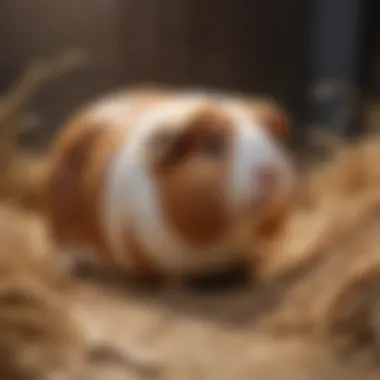Essential Guide to Feeding Your Guinea Pig Properly


Intro
Understanding the dietary requirements of guinea pigs is essential for their well-being. These small animals have unique nutritional needs that, when met, contribute to a happy and healthy life. As a prospective or current guinea pig owner, the responsibility of providing proper nutrition rests heavily on your shoulders. This guide seeks to enlighten you on the crucial aspects of feeding your guinea pig. From the types of food suitable for their health to essential dietary components, each section aims to ensure you have a comprehensive understanding of how to feed these delightful pets.
Understanding Your Pet
Pet Behavior Basics
Guinea pigs are social creatures that display specific behavior traits. They communicate through vocalizations and body language. Listening to their sounds can give insight into their emotions, such as joy, fear, or discomfort. Familiarizing yourself with these behaviors will enhance your ability to recognize when your pet is happy or stressed. Understanding their behavior also plays a role in how they interact with their food. Guinea pigs may exhibit curiosity towards new food, motivating you to introduce diverse dietary options.
Common Breed Characteristics
There are several breeds of guinea pigs, each possessing distinct traits. For example, the American guinea pig is commonly recognized for its short, smooth coat. In contrast, the Abyssinian boasts a unique rosette pattern. Awareness of these characteristics can aid in understanding the preferences of various breeds, as some may have different dietary needs or inclinations.
Species-Specific Needs
Guinea pigs have specific nutritional requirements. Unlike other rodents, they cannot synthesize Vitamin C naturally, making it crucial to provide sources rich in this vitamin. A lack of Vitamin C can lead to serious health issues over time. This aspect highlights the importance of catering to their nutritional needs more than just filling their bowls with food.
Pet Care and Maintenance
Feeding Guidelines
A balanced diet for a guinea pig consists of three main components: hay, vegetables, and pellets. Hay should constitute the bulk of their diet. Timothy hay is highly recommended as it provides fiber necessary for digestion. Fresh vegetables, such as bell peppers and leafy greens, add essential vitamins. Pellets should be chosen carefully, ensuring they are high in fiber and specifically formulated for guinea pigs. Overfeeding can lead to obesity, so monitoring portion sizes is essential.
Grooming Essentials
Regular grooming is important not only for hygiene but also for bonding. While guinea pigs self-groom, they benefit from occasional brushing, especially long-haired breeds. This helps prevent matting and skin issues.
Hygiene Practices
Keeping their living environment clean is fundamental. Daily cleaning of their habitat and fresh bedding ensures a good living condition. Absorbent bedding materials can help control odors and maintain moisture levels, contributing to their overall health.
Health and Wellness
Routine Vet Check-ups
Routine veterinary visits can identify health issues early. A veterinarian specialized in exotic animals can provide valuable insights into your guinea pig's health. Regular check-ups should be at least once a year.
Vaccination Needs
Vaccinations are not generally required for guinea pigs, but maintaining good health practices can prevent illnesses. Always consult with a veterinarian regarding any potential vaccines that might benefit your pet.
Recognizing Signs of Illness
Being vigilant about your guinea pig's habits is crucial. Signs of illness can include changes in appetite, lethargy, or unusual vocalizations. Early detection of these signs can lead to timely intervention.
Enrichment and Activities
Indoor vs.
Outdoor Activities
Both indoor and outdoor activities provide opportunities for mental stimulation. Indoor play areas can be created with tunnels and hiding spots. Outdoor time should be supervised, ensuring the environment is free of hazards.
Interactive Toys and Games
Interactive toys, like chew toys, stimulate their natural behaviors. Rotating toys weekly can keep your pet engaged and interested.


Socialization Opportunities
Guinea pigs thrive in social environments. Spending time with them, whether through gentle handling or simply being nearby, can foster a strong bond and decrease stress.
Important Note: Proper nutrition is foundational to the health of guinea pigs. Lack of knowledge regarding their dietary needs can lead to serious health problems. It's vital to stay informed.
Understanding Guinea Pig Nutrition
Proper nutrition is crucial for the health and longevity of guinea pigs. Understanding what constitutes a balanced diet for these small animals is not just beneficial but essential. Guinea pigs are herbivores, and their digestive systems require specific types of food to function correctly. Poor nutrition can lead to various health problems, affecting their overall well-being.
One of the primary reasons for focusing on guinea pig nutrition is the prevention of diseases. An adequate diet helps avoid dental issues, obesity, and gastrointestinal problems. Additionally, it supports the immune system, allowing these animals to resist infections. Furthermore, good nutrition can significantly enhance their quality of life, leading to a more active and vibrant pet.
The Role of Nutrition in Guinea Pig Health
Nutrition plays a pivotal role in guinea pig health. The right diet ensures that they receive all the essential vitamins and minerals. For example, vitamin C is vital, as guinea pigs cannot synthesize it themselves. A deficiency can lead to serious health issues, including scurvy. By understanding the nutritional importance, pet owners can cultivate an environment where their guinea pigs thrive.
Maintaining a balanced diet fosters strong bones and teeth. Guinea pigs have continuously growing teeth, which must be worn down through chewing fibrous materials. Proper nutrition balances the necessary roughage, ensuring dental health and preventing pain associated with overgrown teeth.
Nutritional Requirements of Guinea Pigs
Guinea pigs have specific nutritional needs that differ from other pets. Their diet primarily consists of hay, fresh vegetables, limited fruits, and high-quality pellets. The combination of these elements ensures that they receive adequate fiber, vitamins, and other nutrients.
- Hay is the cornerstone of their diet as it provides essential fiber.
- Fresh vegetables offer variety and important vitamins.
- Fruits are high in sugar and should only be given as occasional treats.
- Pelleted food should be high in fiber and free of seeds or nuts.
Guinea pigs require a daily intake of fresh hay. Timothy hay, orchard grass, or meadow hay are all suitable. This high-fiber component promotes good digestion and helps maintain a healthy weight. In addition to hay, they should have a selection of fresh vegetables, such as bell peppers and leafy greens, to ensure they receive vital nutrients.
By recognizing these requirements, guinea pig owners can create a comprehensive diet that meets the health needs of their pets. It involves being mindful of what is offered, and understanding the limitations and benefits of each type of food.
Essential Components of a Guinea Pig Diet
Understanding the essential components of a guinea pig diet is crucial for ensuring their overall health and well-being. Each element plays a role in promoting good digestion, maintaining a healthy weight, and preventing common health issues. Focusing on these components will help owners provide a balanced diet tailored to meet their pet's specific needs.
Hay: The Staple Food
Hay is the foundation of a guinea pig’s diet. Timothy hay, Orchard grass, and Meadow hay are excellent choices. These hays are high in fiber, which is vital for digestive health. A constant supply of fresh hay encourages natural foraging behaviors. Additionally, it helps to wear down teeth that continuously grow throughout their lives. Without sufficient hay in their diet, guinea pigs may suffer from digestive issues or dental problems.
Fresh Vegetables for Nutritional Variety
Recommended Vegetables
Fresh vegetables offer nutritional variety and are essential for a guinea pig's diet. Leafy greens such as romaine lettuce, cilantro, and bell peppers are good options. These vegetables are rich in vitamins and minerals. For example, bell peppers contain high levels of Vitamin C, which is critical for guinea pigs as they cannot produce it themselves. Regularly including a mix of different vegetables ensures a broad spectrum of nutrients. However, it is important to introduce new vegetables slowly to monitor for any digestive issues.
Vegetables to Avoid
Some vegetables should be avoided due to their potential harm. For example, potatoes and onions can be toxic to guinea pigs. These vegetables contain compounds that interfere with their digestive system. Additionally, starchy vegetables can lead to obesity and digestive disturbances. Educating oneself on the safe and unsafe vegetables is fundamental for every guinea pig owner, ensuring the pet's safety and health.
Fruits: Treats in Moderation
Fruits can serve as occasional treats, enriching the guinea pig's diet. However, they should be given in moderation due to high sugar content.
Safe Fruits
Safe fruits such as strawberries and apples can be delightful for guinea pigs. These fruits provide natural sugars along with fiber, making them a tasty treat. Reducing fruit portions helps to manage sugar intake while still enjoying the benefits of various flavors and nutrients.
Fruits to Limit
It is important to limit fruits such as bananas and grapes. While these are not toxic, they are high in sugar and should only be given sparingly. Overconsumption of sugary fruits may lead to health issues like obesity or diabetes. Ensuring a balanced diet means being cautious with fruit treats.


Commercial Guinea Pig Food Options
Choosing the right commercial food for your guinea pig is essential for its health and longevity. This section outlines different types of commercial feed available, how to identify high-quality products, and factors to avoid. A proper diet supports a guinea pig's metabolic and physiological needs, ensuring they remain active and free of health issues. Pelleted food will likely be a significant component of your pet's diet. However, not all pellets are created equal, making it crucial to assess your options carefully.
Types of Pelleted Feed
Pelleted feed serves as a primary source of nutrition for guinea pigs. It usually contains a blend of hay, grains, and added vitamins. There are mainly two types of pelleted feed available in the market:
- Plain Pellets: These does not contain any added ingredients, apart from essential nutrients. They rely heavily on formulated nutrients and fill parameters for a balanced diet.
- Fortified Pellets: These include additional flavors, herbs, or vitamins. Fortified options may be attractive but are not always necessary.
When selecting a pellet, ensure that it is designed specifically for guinea pigs. Products intended for other rodents may lack critical nutrients. Read labels and understand the primary ingredients to make an informed choice.
Choosing High-Quality Pellets
Selecting high-quality pellets is fundamental to maintaining your guinea pig's health. Here are key factors to consider:
- Ingredient List: Look for a short ingredient list featuring whole ingredients like timothy hay or oat hay as the main components. Avoid products high in corn or soy.
- Guaranteed Analysis: This provides details about protein, fat, and fiber levels. Ideally, your guinea pig needs a diet with 16%-20% fiber, ensuring digestive health.
- Vitamin C: Guinea pigs cannot produce vitamin C and must obtain it through their diet. Ensure that the pellets contain enough vitamin C, ideally at least 500 mg/kg.
Read reviews and investigate brands. Trusted products like Oxbow Essentials and Kaytee offer fortified options that meet nutritional standards.
Avoiding Unsafe Ingredients
When navigating the commercial guinea pig food landscape, being aware of harmful ingredients is crucial. Here is what to avoid:
- Sugar: Some pellets contain added sugars that contribute to obesity and dental problems.
- Seeds and Nuts: These are higher in fats and may lead to malnutrition.
- Artificial Ingredients: Watch for artificial colors, flavors, or preservatives, as they can be detrimental to your pet.
When in doubt, consult your veterinarian for recommendations on the safest and nutritious foods for your guinea pig. Providing the best pelleted food is integral to your pet's overall well-being and supports a robust, healthy lifestyle.
Remember: A good diet is the foundation of a thriving guinea pig. Always prioritize their needs in your pet care choices.
Feeding Schedule and Practices
Feeding schedule and practices are fundamental aspects of ensuring the health and well-being of guinea pigs. A consistent routine not only helps prevent obesity but also promotes digestive health. Understanding how to establish daily feeding practices can lead to improved nutrition outcomes.
Daily Feeding Routine
Guinea pigs thrive on routine. They typically enjoy being fed at the same times every day. The daily feeding routine should include fresh hay, vegetables, and a small portion of pellets. Most owners find a feeding schedule of twice daily works well. This helps maintain their natural grazing behavior and keeps their digestive system functioning properly.
The key characteristic of a daily feeding routine is consistency. When guinea pigs know when they will receive food, they can better anticipate feeding times, which reduces stress. Additionally, regular feeding schedules lead to better monitoring of their eating habits.
Portion Control for Guinea Pigs
How Much to Feed Daily
Understanding
Common Mistakes in Feeding Guinea Pigs
Feeding guinea pigs correctly is crucial for their health and well-being. Many pet owners make mistakes that can lead to long-term health issues. Understanding the common errors in feeding can help in providing a better diet for these pets. This section highlights key missteps that can occur in daily feeding practices.
Relying Solely on Pellets
One of the significant errors guinea pig owners often make is relying solely on commercial pellets as the primary food source. While pellets can be convenient and are formulated to provide essential nutrients, they should not be the only component of a guinea pig's diet. Pellets lack the necessary fiber and variety found in fresh hay and vegetables.
Guinea pigs need a balanced diet that includes good quality hay, vegetables, and an occasional fruit. Pellets should complement the diet rather than dominate it. A balanced diet helps maintain a healthy digestive system and provides vital vitamins and minerals. Overdependence on pellets can lead to obesity and nutritional deficiencies. Ensure you choose high-quality pellets specifically designed for guinea pigs, but always offer a variety of fresh foods.
Neglecting Vitamin Needs


Vitamin C is critical for guinea pigs as they cannot synthesize it naturally. Many owners overlook the need for this vitamin, thinking that pellets alone are enough. This neglect can result in scurvy—a disease caused by a deficiency of vitamin C, leading to various health issues such as lethargy, swelling of joints, and poor coat condition.
To avoid this mistake, ensure your guinea pig has a steady supply of fresh vegetables high in vitamin C. Foods such as bell peppers, parsley, and kale are excellent choices. Additionally, consider vitamin C supplements if natural sources are insufficient. Be mindful that vitamin C can degrade over time; thus, fresh food should be offered daily.
Feeding Unsafe Foods
Many pet owners might not be aware that some foods are harmful or toxic to guinea pigs. It is essential to avoid feeding them certain fruits and vegetables that can pose serious health risks. For instance, iceberg lettuce and potatoes should never be given, as they can cause digestive upset or be toxic.
Always conduct thorough research or consult with a veterinarian about what is safe for guinea pig consumption. Providing incorrect or harmful foods can lead to immediate health issues or long-term complications. It is best to stick to recommended foods and ensure a diverse range of safe options for your pet.
Maintaining awareness and educating oneself about guinea pig nutrition is key to preventing these common mistakes.
Monitoring and Adjusting Diet
Monitoring and adjusting the diet of guinea pigs is vital for their health and longevity. These small animals have unique nutritional needs which can change as they age. Regularly observing these shifts allows pet owners to provide the best care possible. This section will highlight how to recognize dietary needs based on the age of the guinea pigs and address health monitoring through diet.
Recognizing Dietary Needs Based on Age
Diet Changes for Young Guinea Pigs
Young guinea pigs, especially those under six months old, require a diet rich in nutrients to support their growth and development. Their energy levels are high, and they need ample calcium, protein, and vitamin C. This specific dietary approach ensures that they grow properly and acquire necessary muscle and bone strength.
One key characteristic of a young guinea pig's diet is the high protein content. This makes a diet rich in fresh hay, high-quality pellets, and certain vegetables essential. Young guinea pigs often thrive on alfalfa hay due to its higher protein and calcium levels. While alfalfa hay is nutritious, it should be offered in moderation, as a lifelong diet high in calcium could lead to urinary issues later in life.
The introduction of various fresh vegetables is another unique feature of their diet. Leafy greens such as parsley, cilantro, and bell peppers can provide necessary vitamins. It's crucial to avoid any foods that are high in sugar or contain harmful ingredients. By tailoring their diets to these specific needs, you can avoid potential problems and support their vibrant growth during early life.
Diet Changes for Senior Guinea Pigs
As guinea pigs age, their dietary requirements shift. Senior guinea pigs often face dental issues and reduced metabolism which can affect their ability to eat and process certain foods. Adjusting their diet to accommodate these changes is essential for maintaining their health and comfort.
The key characteristic of a diet for senior guinea pigs is its focus on softer, easier-to-digest foods. This includes switching to grass hay, which is less abrasive on their teeth while still providing necessary fiber. Additionally, offering softer vegetables and eliminating hard fruits can help make eating more comfortable for them.
A unique feature in their diet is the increased emphasis on hydration. Its important for senior guinea pigs to have easy access to fresh water at all times. Keeping their environment hydrated also supports their health.
Monitoring their weight and behavior is crucial. Any changes can indicate health issues that require immediate attention. Changes in diet for seniors can also help prevent obesity, ensuring they remain active and healthy in their later years.
Health Monitoring Through Diet
Observing changes in your guinea pig's eating habits can provide insight into their overall health. If they are less interested in their food or if their droppings change in appearance, these could be signs of health complications. Providing a balanced diet ensures that they receive necessary nutrients while allowing for close monitoring of their health.
Regular vet visits can complement dietary monitoring. These check-ups help identify any underlying health issues early, allowing for timely interventions. Furthermore, keeping a journal of their eating behaviors and any changes can help pinpoint areas that might need adjusting in their diets.
Maintaining a well-balanced diet tailored to the guinea pig's age and health condition is essential for their happiness and longevity.
By being proactive and attentive to your guinea pig's dietary needs, you can foster better health and a happier life.
Epilogue
In summary, understanding how to feed guinea pigs properly is essential for their overall health and longevity. Nutrition plays a vital role in ensuring these small pets can thrive in a domestic environment. Owners need to be aware of the specific dietary requirements unique to guinea pigs and to avoid common mistakes that could compromise their well-being.
Summary of Feeding Best Practices
To ensure your guinea pig enjoys a well-rounded diet, follow these best practices:
- Provide unlimited hay daily. Timothy hay or meadow hay serves as the core of their diet and helps maintain dental health.
- Incorporate fresh vegetables. Aim for a variety of colors and types, including leafy greens like romaine lettuce and bell peppers, which are rich in nutrients.
- Offer fruits as treats, but in moderation. Small pieces of apple or blueberry can be a delightful occasional snack.
- Select high-quality pellets. Look for those formulated specifically for guinea pigs which contain no harmful ingredients like seeds or nuts.
- Maintain a regular feeding routine. Consistency helps in monitoring their intake and any changes in appetite.
Being diligent about these practices enhances your guinea pig's health and ensures they have the energy and vitality to enjoy life.
Fostering a Healthy Lifestyle
A healthy lifestyle for guinea pigs goes beyond their diet. It involves creating an environment that promotes their physical and emotional well-being. Here are elements that contribute to their overall health:
- Social Interaction: Guinea pigs are social animals and thrive when they have companionship, either from other guinea pigs or regular interactions with their owners.
- Clean Living Environment: Regular cleaning of their space is necessary to prevent disease and keep them comfortable. Make sure to change bedding frequently and remove spoiled food.
- Exercise Opportunities: Provide a safe area for your guinea pigs to explore and exercise. This keeps them physically fit and mentally stimulated.
- Regular Vet Check-ups: Routine veterinary care helps catch health issues early. This is important in maintaining a long, happy life for your guinea pigs.
By focusing on these aspects alongside a balanced diet, you create an environment where guinea pigs can thrive, ensuring they have a fulfilling life as your beloved pets.







